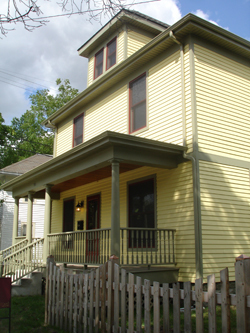
In the Entrepreneurship Bootcamp class this semester, the ESTEEM students spent a class period discussing the implications of a recent MIT Entrepreneurship Review article entitled “The Unexotic Underclass”. The article states that many complain that entrepreneurs are putting their talents to waste by failing to solve Big Problems –capital B, capital P- (famine, clean energy, climate change, etc.) and instead focusing on the easily lucrative “anti-problems” epitomized in the variety of useless apps on our smartphones. The author presents another perspective by pointing out that there is not only a need to solve the high-profile Big Problems, but perhaps a more pressing urgency to solve big problems – little b, little p.
These big problems are the issues plaguing the “unexotic underclass”-- those people in society where it is not trendy or glamorous to help. From the single mother to the veteran returning home unemployed, there is a vast ocean of unsolved big problems that remain largely unsailed by today’s entrepreneurs.
The author ends the piece calling entrepreneurs and educational institutions to start channeling their talents to address these big problems by (among other things) beginning to partner with groups already working with people in the unexotic underclass like non-profits. In the spirit of social entrepreneurship this blog will, in three segments, take a look a three South Bend non-profits to see how entrepreneurship and technology has served and can serve their mission to empower people in the unexotic underclass.
The first non-profit we talked to is the Near Northwest Neighborhood Incorporated (NNN), a group with three main goals:
- 1) Promoting affordable housing,
- 2) Getting families in need into housing, and
- 3) Empowering community members.
Kathy Schuth, the executive director of the NNN says the work the NNN does involves a lot of leg-work on data-driven things. This includes things like providing neighbors with information on vacant homes in their area to organizing neighbors to participate in a beautification project.
Schuth pointed out that in recent years the city has done a great job of getting vacant and abandoned housing information available through the GIS maps on the Open Data Portal. Additionally, a class from Notre Dame taught by Dr. Danielle Wood had students collecting data and creating a conditions report for the houses in the neighborhood. Eventually the NNN could set up a GPS tool with the information so “whenever a neighbor calls up looking for information, we can see from our desk what is happening out there,” said Schuth.
These efforts have been very helpful for tackling some of the NNN’s goals, but Schuth says the group is still in need of innovation in outreach, “People who are signed up on our listserve or mailing list get our info but we have a hard time reaching out to others.” This problem is made worse because of the high rate of overturn in houses. Additionally, people in the neighborhood may prefer to be contacted in different ways; the elderly may prefer a face to face visit while young families may be best served with an email.
Overall, Schuth hopes that the progress made thus far will serve to support the work of the NNN in the future. There is, however, great potential for innovative solutions to how the NNN gets to know people in the neighborhoods and gains their trust. This all starts with establishing contact with the neighbor. Schuth says, “We have so many ways of sharing info these days, but our group still hasn’t found a way to get it into the hands of people who need it.”
For more information on the NNN or if you’d like to help their mission contact them through their website.